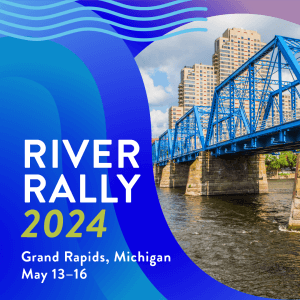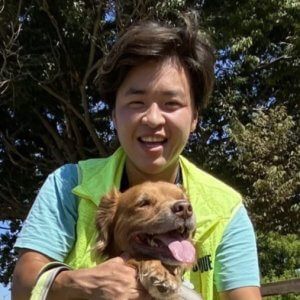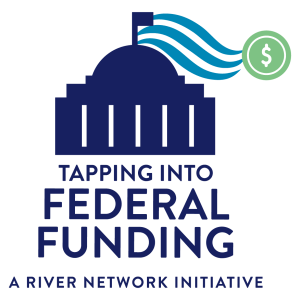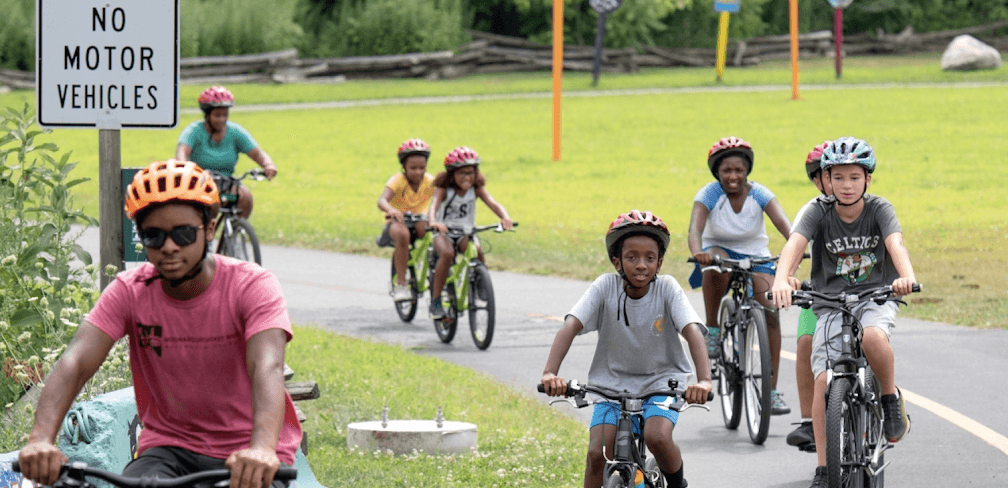River Voices: November 2023

Welcome to the November 2023 edition of River Voices. This month we’re looking at community engagement around litter by sharing the first in a new video series. Plus, River Rally session proposals close this Friday, 11/10.
Addressing Litter in Partnership for Community
For over 15 years, River Network has been engaging and partnering with groups across the US in litter management efforts. Through our partnership with Coca-Cola, we support local groups to identify and develop long-term solutions that are rooted in community and ecological health and partnership development. In our NEW 5-part video series, River Network and two of our partners share tips on how to dive deep into your community’s litter issues by: knowing your community, engaging your community, focusing your efforts, and investing for the long term.
To kick off the video series, check out the first video above, Addressing Litter: In Community Waterways. During the month of November, we will release a new video each week – we hope you will join us!
Our gratitude to the partners highlighted in the video series: Freshwater in Minnesota, and Freshwater Land Trust in Birmingham, Alabama.
A main goal of this project is to get people thinking upstream, about actions they can take to help their watershed. This litter capture boom is just one way that Freshwater gets more people thinking about a problem and taking collective action to solve it.”
– Kris Meyer, Senior Programs Manager, Freshwater
Just TWO DAYS left to submit a session proposal for River Rally 2024!
We’ve improved the process this year, so be sure to read through the Session Proposal Submission Guidance. There, you’ll also find info on the selection process and the speaker discounts and scholarship opportunities.
“It’s not just a cleanup organization, it’s a community where people can share their passion for environmentalism.”
Max is the founder of itisOVERDUE, a small nonprofit leading trash cleanups in the greater LA area and beyond. River Network supported their 2023 Earth Day cleanup.
In September the Biden Administration put out a new guide that lists the different technical assistance (TA) programs available to help communities access federal funding for water and resilience projects.
We have additional resources on our Tapping Into Federal Funding Hub.
Every year, around the time of the Clean Water Act’s anniversary, we like to reflect on our nation’s most fundamental clean water law and showcase a few of the many ways water advocates have used the Act to improve the health of their waterways. Coming off of the major 50th anniversary milestone, this 51st year proved to be one for the books. We’ve seen a devastating Supreme Court ruling, new rules published by the Environmental Protection Agency (EPA), the Act used to protect local waters, and through it all – a never wavering community of clean water advocates raising their voices for their rivers and streams.
Read more about the CWA in our recent staff blog.
CEO Raj Shukla also spoke with Julian Gonzalez, one of our board members, to weigh in on the biggest federal issues for water advocates right now. Julian serves as senior legislative counsel for Earthjustice’s Healthy Communities team in Washington, D.C. Watch the video at left and follow us on Instagram for more!
When EPA takes a step back on protections, it’s up to our cities, our towns, and our states to really make that up. That’s where River Network has a great opportunity. We’re in cities, towns, and communities throughout the country and we need to improve the protections for our waters, our watersheds, and our communities. That’s always been urgent, but especially now after the Supreme Court decision.”
– Julian Gonzalez, Senior Legislative Counsel at Earthjustice
UWLN Learning Series: Building Water Equity & Climate Resilient Communities for ALL
November 15, 10am PT / 1pm ET
Join us for part three of our six-part series, highlighting a variety of strategies that community-based organizations can use to help their communities anticipate, prepare for and respond to climate risks. This fourth session will share River Network’s Community-Led Research tool and feature speakers from local organizations that have deployed CLR as a tool for climate equity, a way to capture community members’ wisdom and experiences and build an advocacy platform to ensure efforts to build community resilience address issues of justice and advance solutions that are based on community needs.
River Management Roundtable: Exploring the New National Wild and Scenic Rivers System Website
November 14, 11:30pm PT / 3:30pm ET
Anyone who manages or advocates for Wild and Scenic Rivers (WSRs) should be familiar with the National Wild and Scenic Rivers System website The Interagency Wild and Scenic Coordinating Council recently revamped the website, so what’s changed? What’s new? Join River Management Society for a tour with Dan Haas, one of the founders of the original site and the project lead for the development of the new site, as he shows us around, takes questions and invites feedback.
Post Sackett: What Can States Do to Protect Wetlands?
November 30, 11am PT / 2pm ET
With the May 2023 Sackett v. EPA ruling significantly weakening the Clean Water Act (CWA), States are left playing defense when it comes to protecting wetlands. Nearly half of States use the CWA definition for Waters of the United States (WOTUS), and anything that isn’t a WOTUS is now vulnerable to pollution and destruction. Join NCEL and Earthjustice for a panel discussion covering: (1) the context and decision of Sackett v. EPA, and (2) what policy options exist to help restore protections for one of the most important ecosystems, to ensure clean water for future generations.
2024 Riparian Restoration Conference: Restoration for the Future
March 5-7, 2024; Grand Junction, Colorado
Join RiversEdge West and over 200 river restoration professionals for a conference emphasizing building resilience in our rivers and riparian ecosystems, as well as the surrounding human communities. How can we support climate resilience in riparian restoration work? How can we ensure that restoration work has lasting impacts that benefit both ecological and human communities?
Learn more about the Riparian Restoration Conference and submit an abstract.
- 📖 We Are the Middle of Forever – Dahr Jamail and Stan Rushworth place Indigenous voices at the center of conversations about today’s environmental crisis, drawing on interviews with people from different North American Indigenous cultures and communities, generations, and geographic regions, who share their knowledge and experience, their questions, their observations, and their dreams of maintaining the best relationship possible to all of life. It’s a welcome antidote to the despair arising from the climate crisis.
-
💻 Native Voices Rising 10th Year Impact Report – Join Native Americans in Philanthropy to celebrate a decade of transformation and empowerment within Indigenous communities.
-
📰 Collaboratives Behind the Scenes: River Network – Thanks to Western Collaborative Conservation Network for featuring our Colorado Basin staff Brian Murphy and Chelsea Silva in their profile series. Give it a read to learn more about our Colorado work.
- 📝 Improving a Program that Works: Recommendations to the New Jersey Water Bank for Advancing Equity – New Jersey Future and the Environmental Policy and Innovation Center just released a new report that analyzes five years of data on the the State Revolving Fund programs in New Jersey and assesses the underlying policies governing how New Jersey defines disadvantaged communities. The report’s ten recommendations would increase the equity and effectiveness of the program and ensure that communities with the greatest needs receive adequate assistance.
Check out the latest Urban Waters Learning Network story map to read more about the multiple benefits of green infrastructure. Case study examples include organizations in Providence, New Orleans, and Tucson that have implemented green infrastructure projects in their communities. The projects not only solve environmental issues but also address community needs.








